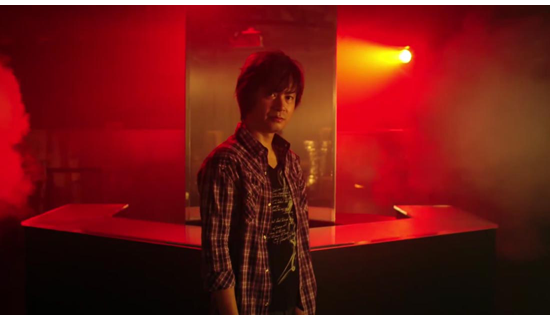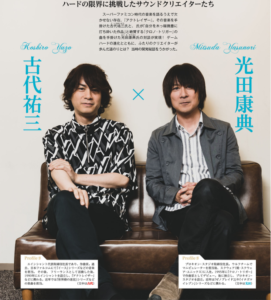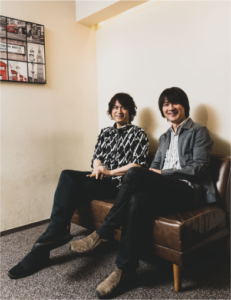In this interview, Yuzo Koshiro not only talks with us about music during the Super Famicom era, but also about working on the indispensable ActRaiser. Yasunori Mitsuda also talks about working on Chrono Trigger, a game that Koshiro said smashed his confidence to pieces. What have their journeys as creators been like, evolving along with the hardware? We’ve got the answers here.
Yuzo Koshiro – The president of Ancient, and also a composer. He previously composed music for the Ys series with Nihon Falcom. Having gone freelance after that, he established Ancient in 1990 and got involved in games such as ActRaiser. In recent years he’s composed music for the Etrian Odyssey series, and more.
Yasunori Mitsuda – The president of Procyon Studio. After working at Wolf Team as a sound programmer, he joined Square (currently Square Enix), and made his debut as a composer with Chrono Trigger in 1995. He later went independent and formed his own company, Procyon Studio. In recent years he’s worked on music for games such as Xenoblade Chronicles 2, the Inazuma Eleven series, and more.
The Industry Shaking ActRaiser
Around when did the two of you first meet?
(Koshiro) It was during the development of Kid Icarus: Uprising, which was released in 2012. Other composers were involved apart from me, but Mitsuda brought us all together. Procyon Studio even took care of all the recording.
(Mitsuda) I’d known of him for a long time, and I figured I’d be able to meet him if I survived in this industry long enough! And we were finally able to meet during Kid Icarus: Uprising, which made me very happy.
Did you know Mr. Koshiro from playing the games he composed music for?
(Mitsuda) That’s right. I was still a student, but I’ve loved game music ever since then. I really loved the games that he composed for with Nihon Falcom, and bought every single one of them. When the ActRaiser soundtrack went on sale, I saw the jacket that had his picture on it and thought “So THIS is what being a game music composer is like, how cool!”. I look up to Mr. Koshiro a lot, even now.
(Koshiro) You’re making me blush (Laughs) My photo appearing on the ActRaiser soundtrack was really just by chance. The soundtrack to a PC-88 shooting game that I worked on called The Scheme had been released before ActRaiser, and apparently my mother secretly sent the record company photos of me at that time. So they were used on that soundtrack. I’m not sure what value it brought, but of course they were also used on the jacket for ActRaiser as well.
(Mitsuda) Game composers just had their names in the credits back then, so you could never even imagine what kind of person wrote that music. During Chrono Trigger I’d hear “It’s probably some old man writing this music” (Laughs) You may have been the first game composer to actually be marketed as an artist?
(Koshiro) That certainly could be.
(Mitsuda) When I worked on the arranged album for Xenogears, I was aspiring to make something like the ActRaiser soundtrack, so I put my photo on the jacket. I kept on preaching that game composers should be presented as artists in all the teams I was a part of, all the way back from the time I was with Square.
Speaking of ActRaiser, it had such beautiful tone quality that sounded like an actual orchestra. And that really shook the industry. Why is it that you thought to make the music sound so orchestral in that game?
(Koshiro) The sound chips up until that point weren’t able to generate anything that sounded like live stringed or wind instruments. However the Super Famicom sound chip was able to do that quite easily. I hadn’t written any orchestral music at that point, but I’d listened to a lot of it. I tackled the orchestral sounds of that soundtrack by using my knowledge of how I’d be able to create certain sounds using certain techniques. We also created our own sound driver specifically to get the sound I wanted for ActRaiser.
How were you able to create your own sound driver?
(Koshiro) I was a programmer too, and I felt that I couldn’t get the most out of the Super Famicom using the dev kit that Nintendo distributed, given the specs of the hardware. The driver that they supplied could only fetch one thing from memory at a time, and that restriction made creating many different stage songs quite difficult. So I asked the lead programmer, and he created a method of shifting between places in memory for each stage. That’s all we did, but at the time it was unprecedented. Incidentally, that same programmer worked on the Ys series too, so he knew how particular I was about sound. I’m glad that he sympathized and created the sound driver program for me.
I see. Mr. Mitsuda, how did you feel when you first heard the ActRaiser soundtrack?
(Mitsuda) I was involved with the creation of the Enix game The 7th Saga (Elnard) at that time, working as an assistant to Norihiko Yamanuki. I heard ActRaiser’s music and was floored! Mr. Yamanuki wondered if we couldn’t achieve a sound like that too, but right from the opening song we figured out it was pretty much impossible! I think the beauty of ActRaiser’s soundtrack had an impact on every single game company at that time.
(Koshiro) It took me quite awhile to find out just how well thought of that soundtrack was. I knew it was valued by the people within the companies involved, but I never imagined that it got so much notice from people at other companies too.
(Mitsuda) Even Nobuo Uematsu has said that it made him change the sound for Final Fantasy IV. It started a revolution!
From The Wonder Of Chrono Trigger Into The PlayStation Era
The other day on Twitter you were talking about how you thought the sound you achieved on the Super Famicom couldn’t be surpassed within the next 10 years.
(Koshiro) Well, I was young back then (Laughs bitterly) Also my perception of the passing of time was different: What would have felt like 1 year back then would be 2~3 years now. Four years after ActRaiser was released came Chrono Trigger, and that smashed the confidence I had into pieces. It really shocked me, and I thought it was absolutely amazing.
(Mitsuda) Even so, there was still a lot of amazing game music during that period in between, right?
(Koshiro) Of course there was. But when I look back on that time, the first thing that comes to mind is how great your compositions were. Originally I was the type of person who preferred more “minor” games. I was very much a contrarian who thought that games are supposed to be played in arcades, and a man should just stand there and silently play shooting games…(Laughs) I liked home console games too, but when I saw how RPGs were influencing the world, I wondered why they were just now getting this much recognition when they’d been on PCs for so long. Basically I was acting like a teenager (Laughs)
(Mitsuda) I know what you mean (Laughs)
(Koshiro) Even though I was looking at Square games gaining popularity from a contrarian point of view, I couldn’t believe how gorgeous Chrono Trigger was when I learned about it (Laughs) And when I played it, I was of course amazed at the overall quality of the game, but particularly with how wonderful the sound and music were. Mitsuda was the first person to shock this arcade devotee with music from a home console game.
Mr. Mitsuda made his debut as a composer with Chrono Trigger after spending a long time working as a sound programmer, but were you also a sound programmer on Chrono Trigger as well?
(Mitsuda) I did work on some of the sound while I was composing, even though the rest of the sound programmers primarily did the sound sampling. But I think my experience as a sound programmer allowed me to get the best sound possible with my compositions.
(Koshiro) You didn’t compose any music when you were with Wolf Team?
(Mitsuda) I didn’t. I worked as a sound programmer and Motoi Sakuraba wrote the music.
(Koshiro) I see. The reason you have such strong preferences when it comes to sound is from your time working as a sound programmer.
(Mitsuda) That’s true, but I’ve always also just loved synthesizers. I often took out loans to pay for expensive synthesizers back then, and my parents got mad at me (Laughs)
(Koshiro) On the other hand, I didn’t have any of that kind of equipment back then. It wasn’t until some time later that I started making use of basic instruments and musical knowledge. Back then I used a PC to make all of my compositions, so I have a lot of respect for that.
It seems that your respective stances on equipment are different, but you have using your deep knowledge of programming in common.
(Mitsuda) Right. If you couldn’t program back then, you weren’t able to produce any kind of sound at all. I think everyone involved in sound could program.
I see. That alone makes it sound like working with sound during the Super Famicom era was difficult.
(Mitsuda) Well…it was (Laughs bitterly)
(Koshiro) It was all difficult (Laughs) Messing with a sound driver like we did for ActRaiser ended up becoming the norm, but getting a driver just right is hard. For example, what if a programmer who doesn’t know anything about music is making changes to it. If a scale is off, they wouldn’t notice because they don’t know anything about music.
(Mitsuda) There was a really good sound programmer at Square then named Minoru Akao, and he helped me out quite a bit in that regard. He worked on a lot of the new features that we used in Chrono Trigger. For example, when you move the map, a common sound source would be used for the current state of the map and the state before the movement occurred. That would reduce the load time by keeping it in memory.
When did the days of agonizing over memory management come to an end?
(Mitsuda) That agony lasted until the PlayStation era, at least to that same extent. From the PlayStation 2 era on, memory became less and less of a concern. I mostly worked on RPGs, and since they have so much music the disc capacity couldn’t always accommodate all of it being recordings. When that was the case, you’d use the internal sound chip for some of it. That made things a bit easier in terms of memory.
(Koshiro) I see. I actually wasn’t composing music during the PlayStation era. I was focused on starting up Ancient and developing games at that point. I guess I can say this now, but game development had become first priority for me and music composition was second. I call it “a composer’s dark period” (Laughs) Things changed for me when the Nintendo DS was released though. It felt like my revival as a composer when I worked on Etrian Odyssey and Wangan Midnight. That’s when I finally felt like I had no restrictions.
(Mitsuda) I felt I was able to compose without restrictions on the PlayStation 2, but then the Nintendo DS came out and I thought “Back to a sound chip again?! I don’t want to have to worry about memory anymore!” as I was working with it (Laughs bitter) Just when I started thinking things were getting easier, the restrictions of the Super Famicom era were back. On a personal level, that left me feeling very frazzled.
(Koshiro) Ahh. The DS had a reasonably rich level of performance, so I was able to get a bit creative with it. I was a bit iffy on the limited specs, but I had the time and it felt like I really pushed it to its limits.
(Mitsuda) Right. But when I actually tried to get creative with it, unexpectedly nothing really came of it (Laughs)
(Koshiro) I know what you mean. Development kits have evolved along with the era, unlike back during the Super Famicom. Development environments are really amazing these days, which has made music composition a lot easier.
Young Aspiring Game Composers Need A “Weapon”
Do game companies seem to be looking for sound staff less frequently than before? It seems that way to me, but what do you both think?
(Mitsuda) It may be less than before. In modern game development it’s more common for the sound work to come in near the end of the development cycle. They’re not just going to leave sound creators sitting around with nothing to do until then, so I think a lot more companies may outsource that these days.
(Koshiro) Personally, I’d be glad if more game companies had directors who knew something about sound.
Is it considerably more difficult to become a game music composer in today’s world?
(Koshiro) The number of young people who want to pursue it are steadily increasing. And as technology develops, the barrier of entry for being a composer gets a lot lower. Long ago you had to buy millions of yen worth of equipment, but now it’s all much easier to do. However since anyone can get what they need to start making music, standing out as a composer may be much more difficult.
(Mitsuda) Definitely. I entered into the industry during the Super Famicom era, and I think that was very lucky. My own abilities matched the capabilities of the hardware. If I’d been behind the curve, I might not have been able to break into the industry. I was able to study sound generation and the fundamentals of music as the hardware evolved, and was able to level myself up. Nowadays people have to know about composition and recording from the beginning. A considerably high level of knowledge is required, which I think makes things a lot harder.
(Koshiro) And after that it’s all a matter of promotion. You’re leveling up your composing, but the times are changing. There are methods that are unique to modern times, like releasing songs on YouTube. Adding an illustration there, adding a new skill to your repertoire…So I think you have to be highly skilled on multiple levels, as opposed to just in the standard ways.
(Mitsuda) It’s gotten easier for me to do self promotion, but I have to be crafty in order to get people to pay attention to my ideas. I think that people looking to be game music composers will have to be able to do more and more as time goes on. There are a lot more games out there than before, and releasing songs for them is different from releasing regular music. Of course this is all true for us as well, it’s necessary for us to keep doing new and original things.
(Koshiro) And we live in a world where human relationships are important. Having proper conversations, a firm understanding of what sort of song you’re looking to create, and conveying our issues to others are all very important.
(Mitsuda) Yeah, those are all very important. Actually the time I spend writing music is a small fraction of the time I spend communicating with others!


